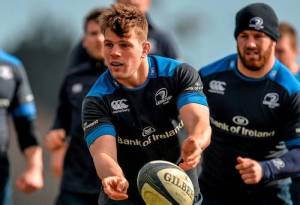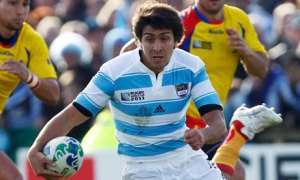Just over a year ago, on the 1st of June 2014, the IRFU announced that former Brumbies player and General Manager of the High Performance Unit with the ARU, David Nucifora, would be joining as “Performance Director” of the IRFU. His responsibilities were to include “planning and evaluation, the elite player development pathway and succession planning and professional coach development and succession planning.” It was expected that this role would bring about a greater degree of fluidity of player movement between the provinces in order to maximise our still relatively small playing pool. To date (and admittedly it is early days for a role such as this) the progress on this front has been frustratingly stunted.
There are two (maybe three) areas of the field in certain provinces where logjams have been created. The two most obvious are the Leinster back row and the Ulster centres. These areas will be explored below. A case could also be made for the inclusion of Leinster’s options at prop, although this is a slightly different case and will not be discussed here.
Leinster’s Back Row
For the past number of years Leinster have been churning out really quality back row players. The current back row of Rhys Ruddock/Jordi Murphy, Sean O’Brien and Jamie Heaslip could play in green and you would not feel particularly weak. They are four international standard players who have little, if anything left to prove at provincial level. The retirements of seasoned veteran (and pundit extraordinaire) Shane Jennings and interim club captain Kevin McLaughlin have not been harshly felt as they saw their roles in recent years diminish due to the presence of quality alternatives aforementioned and rising young talent Dominic Ryan. Last season also saw the emergence of one Jack Conan, who provides a genuine alternative for Leinster’s Ironman Captain, Heaslip. Behind these players were promising academy talents Josh van der Flier (who has been one of Leinster’s players of the season thus far) and highly touted Dan Leavy.
By my count that gives Leinster 6 international standard backrows (Conan and Ryan have been capped), and two talents who have already shown they are at the very least Pro 12 standard as of right now. The problem here is the amount of minutes, particularly for 25 year old Ryan. At this stage of his career the Gonzaga alumnus should be looking to push into the international reckoning, but he will struggle to warm the Leinster bench in any key games due to the presence of the also youthful Murphy, Ruddock and O’Brien. Ryan has flashed his potential on many occasions, but through a mixture of bad fortune with injury and an inability to get minutes due to the competition for places at Leinster, his development to date has not been as great as was probably expected.
Ulster’s Centres
If you had have said following the last Rugby World Cup in 2011 that Ulster would send two centres to the World Cup in 2015 with Ireland, you probably would have guessed at Nevin Spence and Darren Cave. Or Luke Marshall. Or maybe in your sagelike wisdom you saw Jared Payne as the long term solution to Brian O’Driscoll’s retirement. You certainly wouldn’t have known about Stuart McCloskey and Sam Arnold, both of whom look promising. And another name not yet mentioned is Stuart Olding. Following Spence’s tragic passing, we are left with Cave, Marshall, Payne, Olding, McCloskey and Sam Arnold – to fill 2 positions. 4 of those have been capped for Ireland. Marshall is 24, Olding is 22, McCloskey 23 and Sammy Arnold is barely out of nappies turning 20 next April.
While now may be a good time to revert back to 15, move Cave to his more natural 13 and give time to the others at 12, there are still too many centres to give enough minutes to all of them. As 4 are still very young, this problem will persist right the way through their development unless there is some movement, either within Ulster or within the IRFU. Movement to the outside channels seems unlikely given the presence of Tommy Bowe, Andrew Trimble, Craig Gilroy and the aforementioned Payne as well as the likes of Peter Nelson, Rory Scholes and Jacob Stockdale from the youth ranks. Ulster have enviable talent from 11 to 15 and it may be better used elsewhere.
Munster’s signings
After looking at backrow and centre options, it may be worth casting an eye over the signings Munster announced in the wake of the long term injury suffered by Peter O’Mahony and the career ending one sadly suffered by Felix Jones.
Munster have signed Pumas full back Lucas Amorosino and Brumbies back row Sean Doyle on 3 month contracts.
Amorosino, it is fair to say, is a journeyman with Munster being his 5th club since 2009. He previously plied his trade at Leicester, Montpellier, Oyonnax and Cardiff Blues. At 29, he has 47 (soon to be 48) caps for Los Pumas, and has averaged 10 games a year over the last 6 seasons. He has not been particularly outstanding for Argentina at this World Cup and has been kept out of their admittedly excellent three quarter line of Juan Imhoff, Santi Cordero and Joaquin Tuculet. Nor was he particularly impressive in the colours of a struggling Cardiff Blues outfit last year. Short term Munster cover – Lucas Gonzalez Amorosino
Doyle, on the other hand, is a 26 year old Sydney born flanker, who Munster hope will solve their dearth of real breakdown dogs. He played 24 times for Ulster in his two seasons there, and made one appearance for the Brumbies in Super Rugby last year. He is a decent player but nothing extraordinary. It would not be disrespectful to either player to suggest that neither are top drawer, world class players. They are solid pros, one of whom is quite experienced, but little more.
In the wake of Argentina unceremoniously dumping Ireland out of the World Cup at the quarter final stage, drastic measures were suggested in some quarters for the betterment of the Irish cause. Giving Sean O’Brien, Jonny Sexton, Cian Healy and Conor Murray (some of Ireland’s few real world class operators) the opportunity to take a sabbatical to give their bodies the best possible chance of making it to Japan in 2019 in good shape was one of the mooted possibilities. At the centre of this was the underlying desire for the national team to push on to greater success, which is the end to which the provinces are a means. While ideas such as that were perhaps far-fetched, do these signings by Munster not smack of a lack of care to progress the national cause? Could one of Leinster’s young back rows have done a job in Munster for the next three months, or even for the season? With regards to Amorosino – Munster have Simon Zebo, Keith Earls, Andrew Conway, Stephen Fitzgerald, Gerhard van der Heever and Shane Monahan who can play in the back three. Dennis Hurley is experienced at fullback. While that would seem plenty, if Munster were not comfortable with those options, could one of the Ulster centres not have shifted down, just for three months or the season, to allow Munster the flexibility to move Earls or Hurley to 15?
Amorosino and Doyle will likely play in a lot of games that would have benefited McCloskey, Marshall, Leavy, van der Flier or Ryan. It is an over reliance on “experience” and not enough of a preference for potential. It is an inferiority complex that we have suffered from that a journeyman with experience playing in a different league must be better than our youngsters. The blame should not rest solely on Nucifora, as there must be some reluctance on behalf of the player (to play for his rivals) and the province (to strengthen their rivals), but seems that this is a large part of his job description that disappointingly remains to be fulfilled. For the good of Irish rugby, and for the elite player development pathway, surely it would be more beneficial for young Irish talent to gain experience of top flight rugby than for a similarly talented foreign player to take those opportunities? Obviously there should be a preference for the provinces to develop their own talent, but there have to be structures put in place that in times of need the provinces will be able to rely on each other for assistance.




